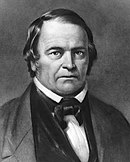
Back الإحباط العظيم Arabic Gran Decepció Catalan Gran Chasco Spanish Grande déception French Nagy kiábrándulás Hungarian Fahadisoam-panantenana lehibe Malagasy Great Disappointment Dutch Dia da Grande Decepção Portuguese Велико разочарање Serbian Den stora besvikelsen Swedish
| Part of a series on |
| Adventism |
|---|
 |
|
|
The Great Disappointment in the Millerite movement was the reaction that followed Baptist preacher William Miller's proclamation that Jesus Christ would return to the Earth by 1844, which he called the Second Advent. His study of the Daniel 8 prophecy during the Second Great Awakening led him to conclude that Daniel's "cleansing of the sanctuary" was cleansing the world from sin when Christ would come, and he and many others prepared. When Jesus did not appear by October 22, 1844, Miller and his followers were disappointed.[1][2][3][4]
These events paved the way for the Adventists who formed the Seventh-day Adventist Church. They contended that what had happened on October 22 was not Jesus's return, as Miller had thought, but the start of Jesus's final work of atonement, the cleansing in the heavenly sanctuary, leading up to the Second Coming.[1][2][3][4]
- ^ a b "Seventh-day Adventist Church emerged from religious fervor of 19th Century". 4 October 2016. Retrieved 27 December 2016.
- ^ a b "Apocalypticism Explained – Apocalypse!". Frontline – PBS. Retrieved 27 December 2016.
- ^ a b "The Great Disappointment and the Birth of Adventism". Archived from the original on 28 February 2021. Retrieved 27 December 2016.
- ^ a b "Adventist Review Online – Great Disappointment Remembered 170 Years On". 23 October 2014. Retrieved 27 December 2016.